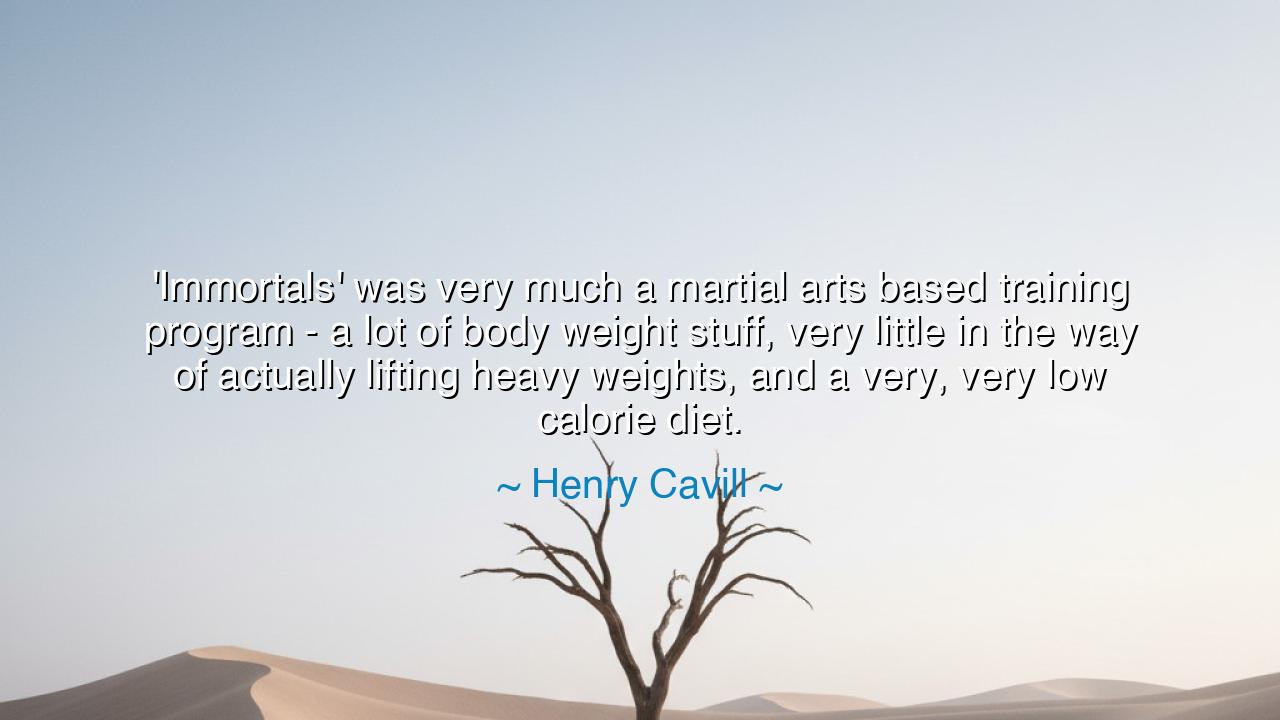
'Immortals' was very much a martial arts based training program -
'Immortals' was very much a martial arts based training program - a lot of body weight stuff, very little in the way of actually lifting heavy weights, and a very, very low calorie diet.






In the time-worn pursuit of strength, vitality, and endurance, there lies a profound lesson that echoes through the ages: true power is born not from excess, but from discipline, focus, and a deep respect for the body’s natural abilities. Henry Cavill, in his reflection on the training regimen for the film Immortals, reveals this truth: "'Immortals' was very much a martial arts based training program—a lot of body weight stuff, very little in the way of actually lifting heavy weights, and a very, very low calorie diet." His words speak to a philosophy that resonates with the ancients—that strength does not come solely from brute force or indulgence, but from the careful cultivation of the body through movement, restraint, and mindful nourishment.
The ancient Greeks, the forebearers of martial discipline, understood the link between the body’s training and its mental and spiritual clarity. Pythagoras, known for his contributions to philosophy and science, emphasized the importance of a disciplined lifestyle, where both mind and body were honed in balance. The Spartans, warriors whose prowess on the battlefield was renowned, trained their bodies not with mere weight lifting but with bodyweight exercises, running, and martial discipline. They believed that to be truly strong, one must be flexible, adaptable, and focused—qualities that Cavill’s training program mirrors perfectly. The ancient warriors knew that strength was not only about the muscle mass you could accumulate but about the control you had over your body and your mind.
In the Roman Empire, strength was not merely the result of physical labor, but of a regimen that aligned the body, the mind, and the spirit. Seneca, the great Stoic philosopher, often spoke of moderation in all things, even in training and nourishment. The Romans believed in discipline—in nourishing the body without excess and in training the mind and body to endure hardship. Cavill's emphasis on a low-calorie diet and martial arts-based training reflects this ancient Roman wisdom—by reducing the body’s reliance on external stimuli (like heavy weights or excess food), the individual could tap into their true potential, developing inner strength and mental clarity, much as the Romans did with their rigorous physical and mental training.
The Buddhist teachings also emphasize the power of restraint and balance. Buddha, in his search for enlightenment, endured great physical challenges, including severe fasting and meditation, to understand the body’s limits. But he did not glorify suffering for the sake of suffering; rather, he embraced moderation. He understood that true strength comes not from indulging the body’s every desire, but from discipline, balance, and mindful nourishment. Cavill’s approach to diet—which focused on low-calorie intake—and his commitment to martial arts training reflects this Buddhist idea that true power lies in the ability to control oneself, to discipline the body, and to avoid excess in favor of mindfulness and purpose.
Consider, too, the example of Hercules, the great hero of ancient Greek mythology. His twelve labors were not merely tests of brute strength but also tests of endurance, strategy, and the ability to overcome both physical and mental challenges. His feats were achieved not by lifting heavy weights alone, but by using his body with precision, agility, and resilience. Much like Cavill’s approach to his role in Immortals, Hercules trained through actions that involved his whole body, often requiring great mental and physical restraint. His strength was not born from excess, but from controlled, purposeful action—the very essence of what Cavill describes in his training regimen.
The story of Alexander the Great, too, illustrates the wisdom of discipline and balance. Alexander, one of history's most formidable conquerors, understood that a soldier’s strength came not just from force, but from resilience—from the ability to endure hunger, hardship, and long campaigns with a clear mind and a steady body. His soldiers, much like the Spartans, trained with a combination of bodyweight exercises and endurance training, preparing their bodies for the challenges ahead. In this way, Alexander embodied the very principles Cavill alludes to—strength is built not just through excess, but through control, focus, and balance.
The lesson that Cavill shares with us through his training is simple yet profound: true strength does not come from indulgence, but from discipline and balance. Just as the ancients knew, it is through careful control—whether through the use of bodyweight exercises or a low-calorie diet—that we unlock our true potential. The story of warriors like the Spartans, Hercules, and Alexander reveals that the most enduring power comes not from extreme excesses, but from a lifestyle that builds strength gradually, mindfully, and sustainably. In our own lives, we must embrace the same principles—nourishing our bodies with purpose, training our minds with discipline, and building strength that lasts through balance and consistency.
Let us take this lesson to heart and integrate it into our lives. Restrain ourselves from the excesses that lead to imbalances, whether in diet, exercise, or indulgence. Like Cavill, embrace the power of a lifestyle that focuses on discipline, balance, and moderation. Whether in the form of martial arts, mindful training, or mindful eating, seek strength that is built not from extremes, but from a steady, purposeful approach to all things. In this way, we can cultivate a vitality that endures, a resilience that withstands time, and a strength that remains unwavering through the challenges of life.






AAdministratorAdministrator
Welcome, honored guests. Please leave a comment, we will respond soon